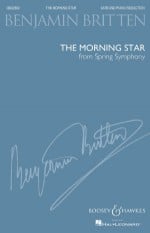Britten, Benjamin - Morning Star (SATB & Piano)
The Spring Symphony was commissioned by the Koussevitzky Music Foundation and is dedicated to Serge Koussevitzky and the Boston Symphony Orchestra. It was actually premiered at the Concertgebouw, Amsterdam in July 1949 before its American premiere the following month at Tanglewood by its dedicatees.
This work is a major undertaking from all points of view. It uses a huge orchestra (complete with cow horn which has to be hired specially), a children's choir which certainly does not have to be composed only of boys, three soloists, and a large SATB chorus which is given very challenging and detailed music to sing. If any work demonstrates the flip side of the Britten coin from Saint Nicolas it must be the Spring Symphony. Here is a seriously intentioned, highly contemporary work for its time which nevertheless shows his predilection for anthologising texts, for creating amazing moments of levity - approaching the humorous episodes in his operas - and producing a score of such colour and vibrancy that the impression left on the mind is indelible. Despite being composed for an American ensemble and conductor this work is quintessentially British. The poems have strong connections with English pastoral imagery and some are forever associated with settings as madrigals. In fact this madrigalian emphasis bubbles gently beneath the surface for much of the work and points up where Britten's roots really lie.
This is a challenging work on all fronts and is an extremely complex composition. It is however eminently performable by a choir of sufficient size to balance the large orchestra and who can rise to the level of attainment Britten requires. It also really does need a childrens' choir - and a children's choir which can sing with real confidence and projection. They are given a key role to play in this work. In fact the 'spring' element so vital to the whole concept is underscored by young singers in the 'springtime' of their lives. This, therefore, has to have a completely different kind of tone quality from the main choir - a second group of sopranos won't do. Beyond these practical caveats this is a score which deserves to be better-known and more often performed than it is, and choirs and orchestras should be encouraged to promote it widely. It is one of the most original choral/orchestral works of the first half of the twentieth century.
Duration [Spring Symphony, complete]: 45 minutes
Paul Spicer, Lichfield, 2011

